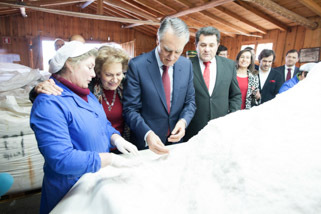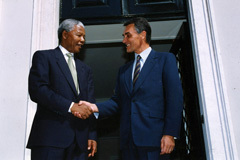
 |
|
 Nelson Mandela is an indomitable fighter for freedom who, throughout decades of captivity never lost the hope of living in a country where all human beings were equal in dignity and rights.
Nelson Mandela is an indomitable fighter for freedom who, throughout decades of captivity never lost the hope of living in a country where all human beings were equal in dignity and rights.
Mandela is equally a model statesman, who stood out in the immense African Continent by the integrity of his character and by his indifference to power. Above all, his indifference to power as such. Because, for Nelson Mandela, the exercise of power only makes sense in order to serve others. And for the others, for his brothers who lived in an iniquitous regime of racial segregation, Mandela committed himself, since his days as a Law student, to South African political life, for which he was sentenced, in 1964, to life imprisonment. More than two decades later he would refuse the offer of conditional release in exchange for renouncing the principles for which he had fought and in which he never stopped believing, even during the most difficult moments spent in Robben Island. This is proof that not even twenty years in prison are capable to shake the firm convictions of true leaders.
Mandela would be freed in 1990, by order of President Frederik De Klerk and, in 1993, both would be awarded the Nobel Peace Prize. The sharing of the Nobel Peace Prize between Mandela and De Klerk, probably the most prestigious prize that anyone can aspire to, was the symbol of a dream of a united South Africa, and the wish that the wounds of apartheid, an imperfect past, filled with hate and discrimination, would quickly be healed.
Nelson Mandela visited Portugal in early October 1993, at a time when the negotiations between the Government of South Africa and the African National Congress had reached a point when the transformation of that country into a multiracial democracy was already irreversible. I met him in the Palace of S. Bento, and from the calmness of his words and the moderation of his aims, I reached the conclusion that I was facing a man to whom more than twenty years in prison had not caused any resentment or desires of revenge. A man who looked ahead, a visionary, who was not looking towards settling accounts with the past and with those who had kept him in prison. I wrote in my Political Autobiography: «Only a man with extraordinary moral stature and human qualities could forgive the suffering he had been through and show himself free of feelings of hatred, recrimination or revenge, and have the clearness of mind to opt for negotiation to demolish apartheid, refusing violence». He was 75, at the time, 27 years of which spent in prison. He had treaded a long path to freedom, to use the words with which he named his autobiography.
That meeting with Mandela, in Lisbon, was the final point in the process of negotiations between Portugal and the South African authorities, which also included a meeting with President Pieter W. Botha, in October 1988, during which I stated the firm intention of Portugal to maintain itself aligned with its European partners in condemning apartheid. The meeting, as I recall in my Political Autobiography, «was not a great success». As I then wrote, «President Pieter Botha exhibited an unfeeling and inflexible stance and my dialogue with him was very difficult». Already before this, in 1987, he had reacted badly to a letter I had written him, showing my satisfaction for the liberation of Govan Mbeki and other political prisoners and enjoining him to take new steps for the reconciliation between all the South Africans. Such steps would later be taken, with courage and determination, by his successor, Frederik De Klerk, whom I met for the first time in 1989, also in São Bento. He later visited Portugal twice, when President of the Republic, and I kept friendly relations with him, even after I left the office of Prime Minister.
Whilst recalling these events, I do not wish to return to a past which has gone by. But, after several decades of public life, I believe we should bear witness to those whom we met and, above all, those who marked us most, as was the case with Nelson Mandela. And we should also demonstrate up to what point the agreed action of States – in this case the members of the European Union – can provide a decisive incentive for carrying out peaceful changes towards freedom and democracy. I am proud of the small contribution I may have provided to make South Africa a free and democratic nation.
Nelson Mandela’s moral stature has kept intact since he took Office as President of South Africa. After leading a difficult process of transition to a new regime, he abandoned power as simply as ever. The simplicity of giants.
© 2006-2016 Presidency of the Portuguese Republic
You have gained access to the records of the Official Site of the Presidency of the Republic from 9 March 2006 to 9 March 2016.
The contents available here were entered in the site during the 10 year period covering the two mandates of President of the Republic Aníbal Cavaco Silva.